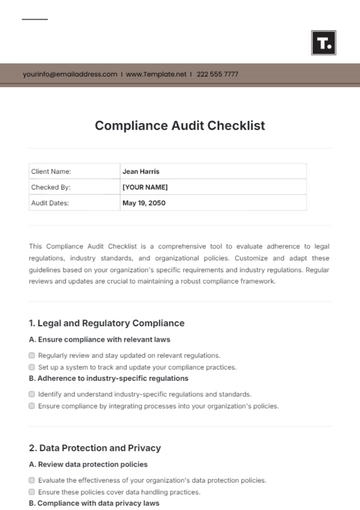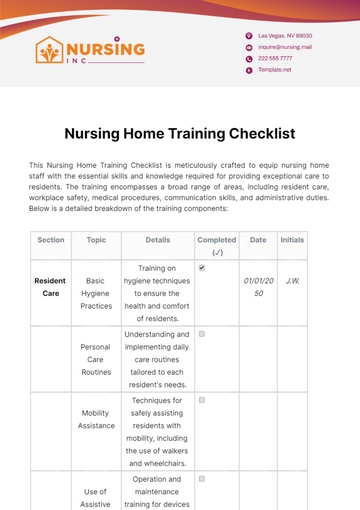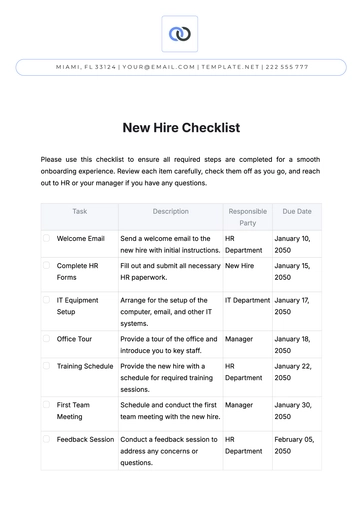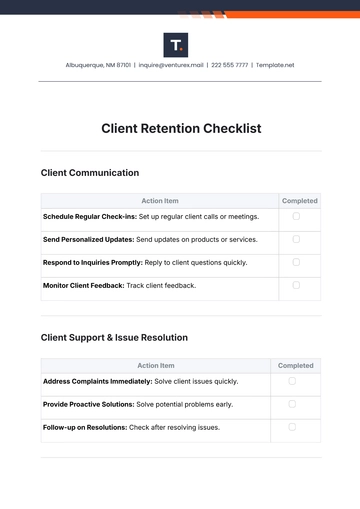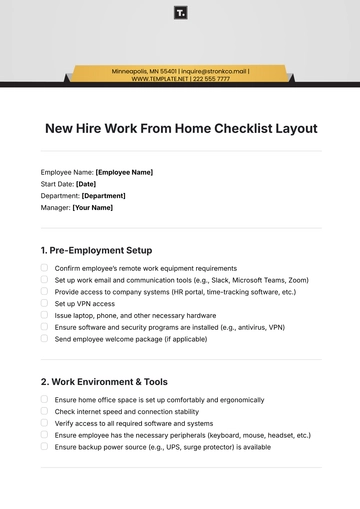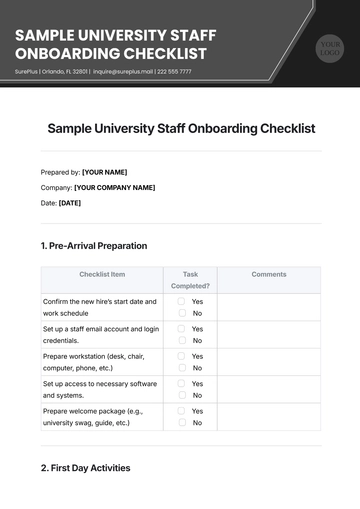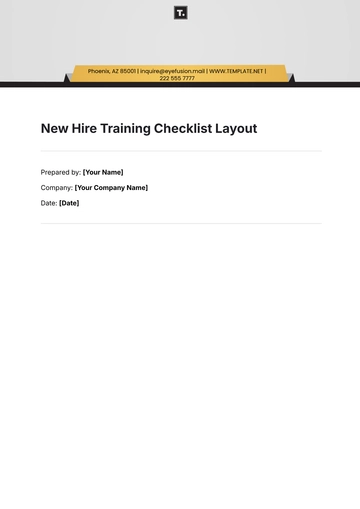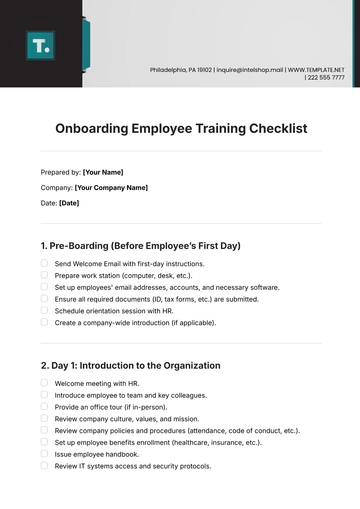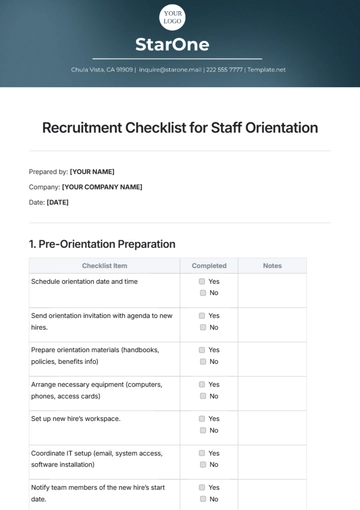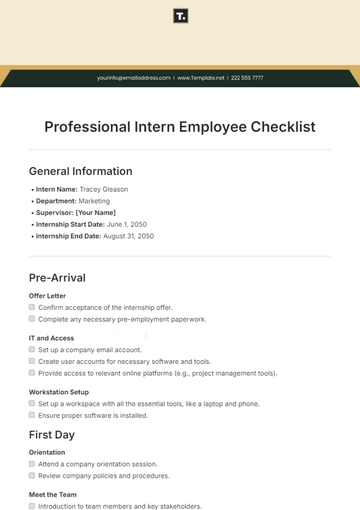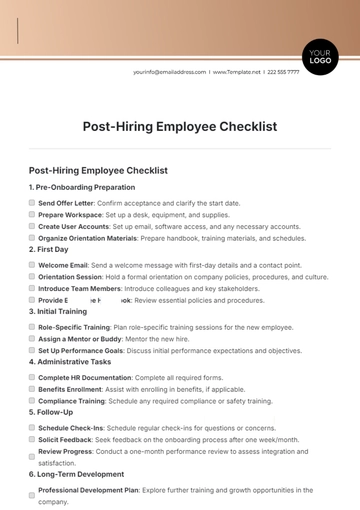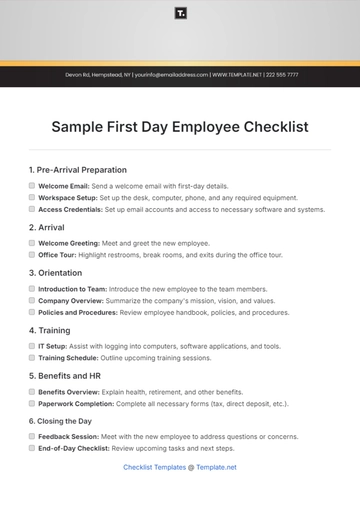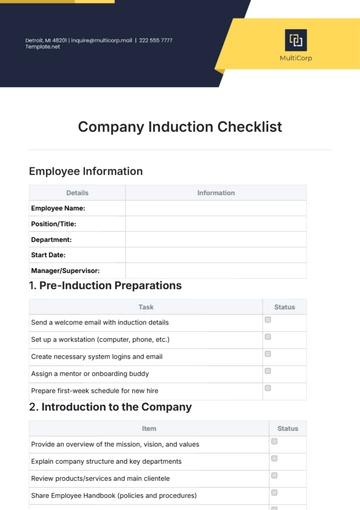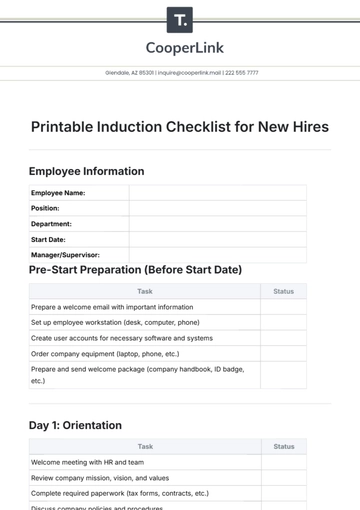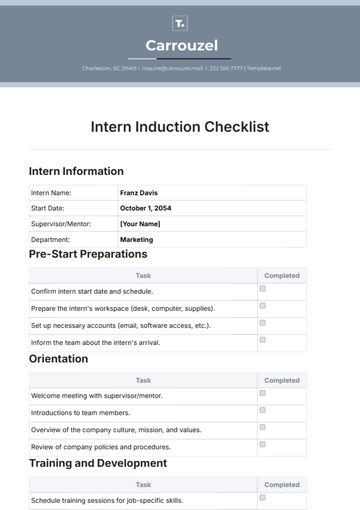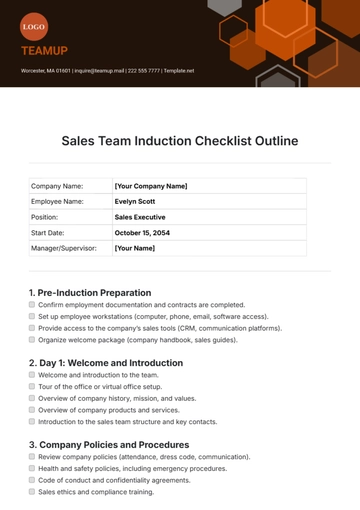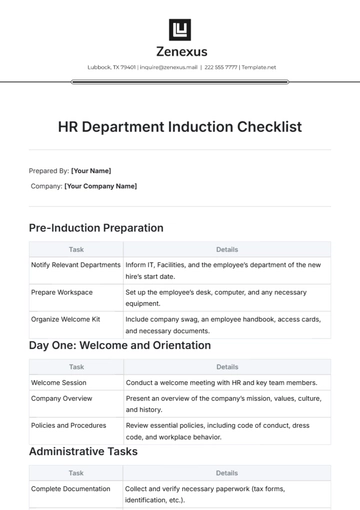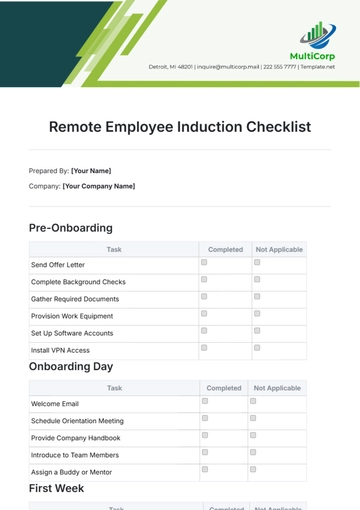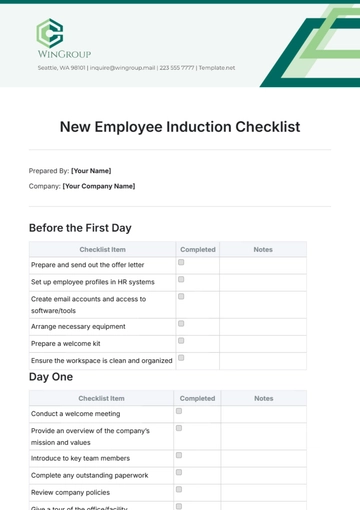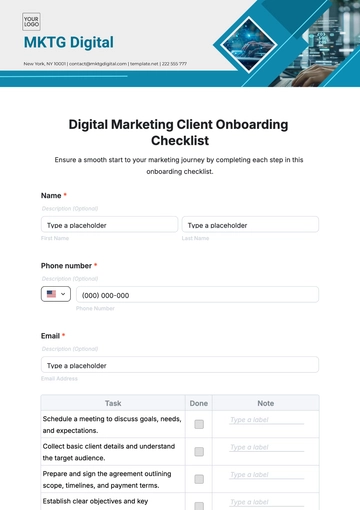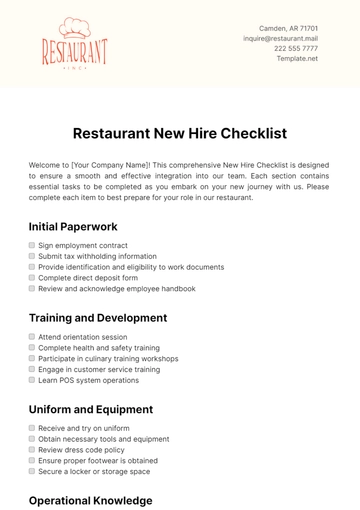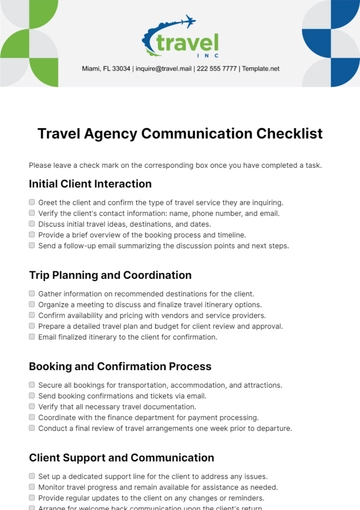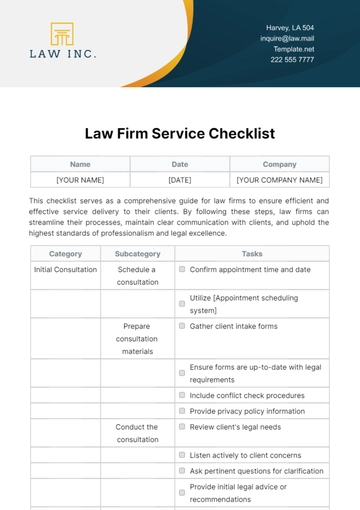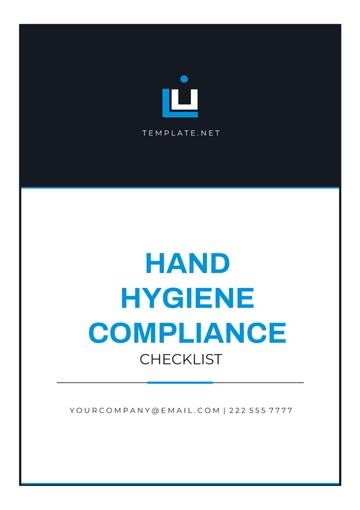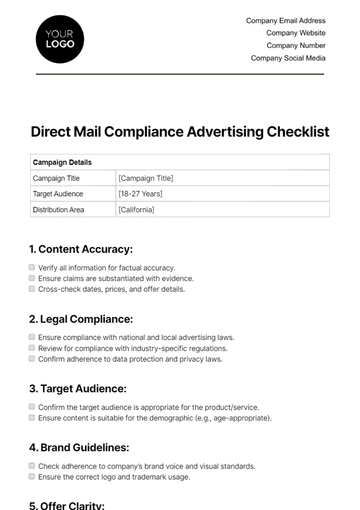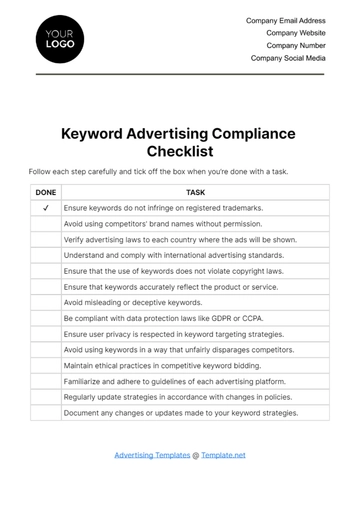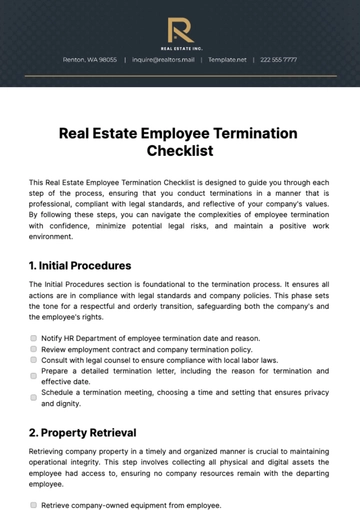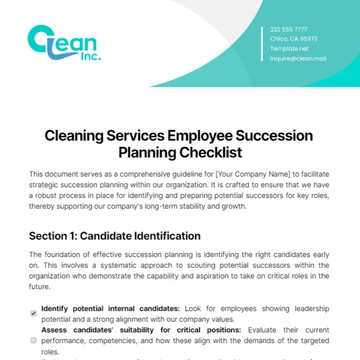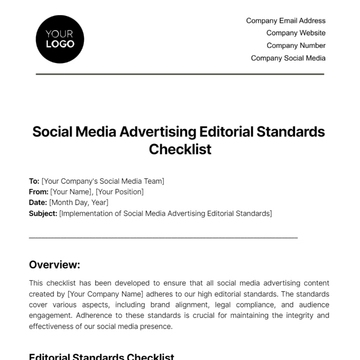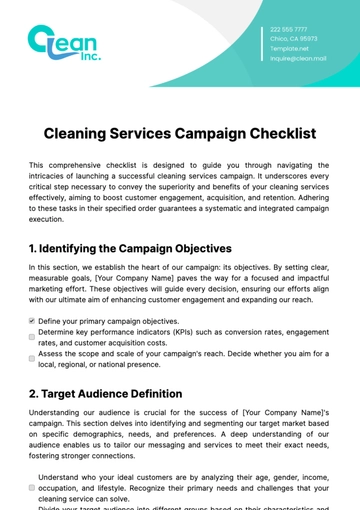Free Nursing Home Training Checklist
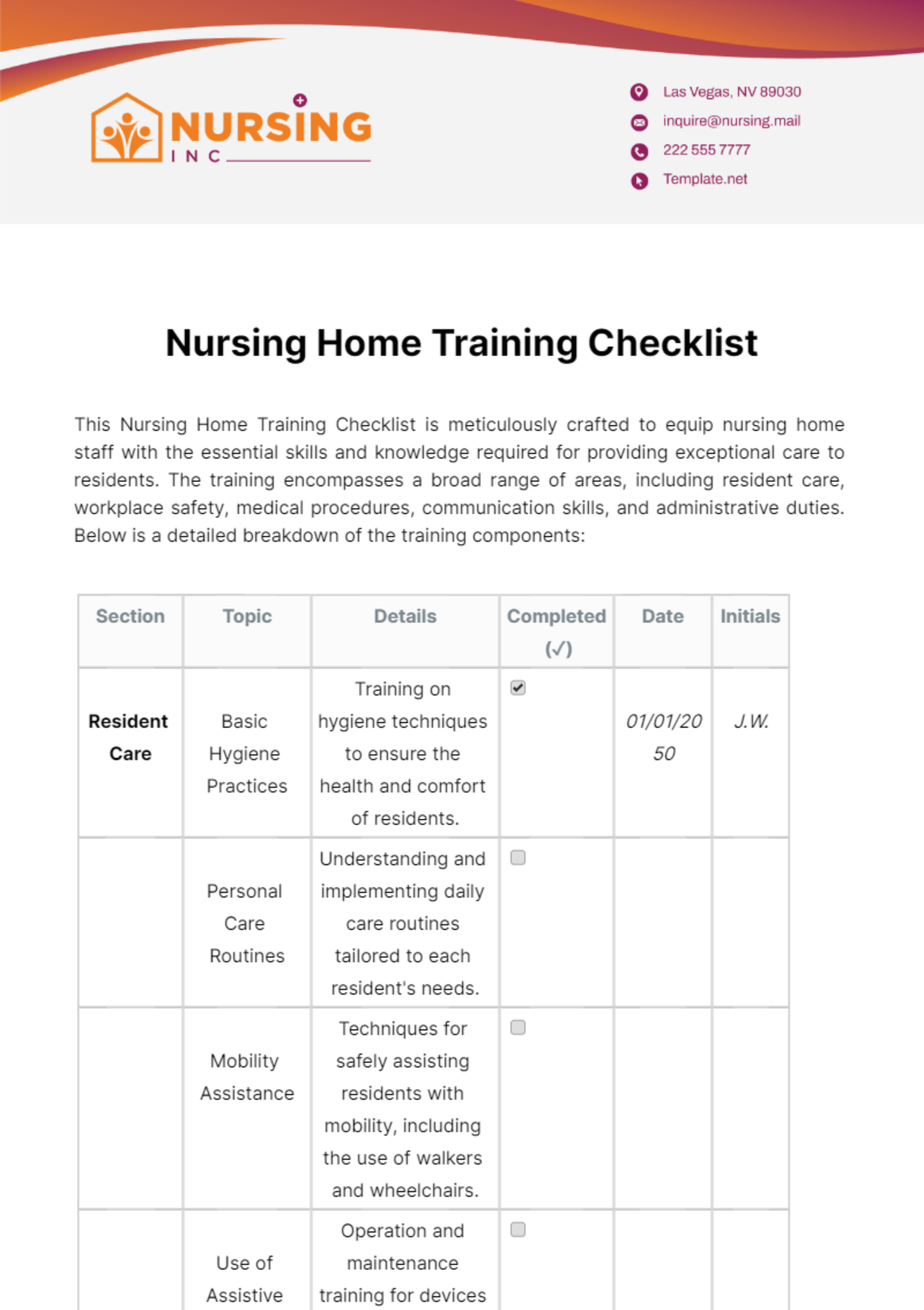
This Nursing Home Training Checklist is meticulously crafted to equip nursing home staff with the essential skills and knowledge required for providing exceptional care to residents. The training encompasses a broad range of areas, including resident care, workplace safety, medical procedures, communication skills, and administrative duties. Below is a detailed breakdown of the training components:
Section | Topic | Details | Completed (✓) | Date | Initials |
|---|---|---|---|---|---|
Resident Care | Basic Hygiene Practices | Training on hygiene techniques to ensure the health and comfort of residents. | 01/01/2050 | J.W. | |
Personal Care Routines | Understanding and implementing daily care routines tailored to each resident's needs. | ||||
Mobility Assistance | Techniques for safely assisting residents with mobility, including the use of walkers and wheelchairs. | ||||
Use of Assistive Devices | Operation and maintenance training for devices designed to aid resident mobility and care. | ||||
Managing Incontinence | Strategies and practices for effectively managing incontinence to promote resident dignity and hygiene. | ||||
Workplace Safety | Safety and Emergency Procedures | Comprehensive overview of emergency response procedures, including evacuation plans and emergency call systems. | |||
Lifting and Transfer Techniques | Safe methods for transferring residents to prevent injury to both staff and residents. | ||||
Fire Safety Drills | Regular drills to ensure staff familiarity with fire safety protocols and escape routes. | ||||
Infection Control Procedures | Training on preventing the spread of infections within the facility, including the proper use of sanitizers and disinfectants. | ||||
Personal Protective Equipment (PPE) | Correct use of PPE to protect against exposure to hazardous materials or infections. | ||||
Medical Procedures | Basic First Aid | Essential first aid skills tailored to common situations in nursing homes. | |||
Medication Administration | Proper procedures for administering medications to residents, including schedule management and dosage accuracy. | ||||
Common Diseases in the Elderly | Awareness of diseases prevalent among elderly residents and their implications on care requirements. | ||||
Monitoring Vital Signs | Training on accurately measuring and interpreting vital signs as an essential part of resident care. | ||||
Medical Emergencies | Preparation for responding to medical emergencies, including stroke, heart attack, and falls. | ||||
Communication Skills | Communication with the Elderly | Techniques for effective and empathetic communication with elderly residents, taking into account hearing or cognitive impairments. | |||
Handling Difficult Conversations | Strategies for managing challenging interactions with residents or their family members in a professional manner. | ||||
Dealing with Family Members | Training on engaging with residents' families, providing updates, and handling inquiries with sensitivity. | ||||
Reporting Concerns | Protocols for reporting health concerns, abuse, or neglect through the proper channels within the organization. | ||||
Presentation and Public Speaking Skills | Enhancing abilities to present information clearly and confidently, both internally and in public forums. | ||||
Administrative Tasks | Record Keeping | Basic principles of accurate and confidential record maintenance, including residents' health and personal information. | |||
Resident Assessment Processes | Understanding comprehensive assessment procedures to determine the care and services needed by each resident. | ||||
Scheduling and Time Management | Effective management of personal and team schedules to ensure that resident care needs are met efficiently. | ||||
Privacy and Confidentiality Laws | Training on laws and regulations governing the privacy and confidentiality of resident information. | ||||
Nursing Home Software Systems | Hands-on training with software systems used in nursing home operations for care planning, documentation, and administration. |
Instructions for Use:
Completed (✓): Mark this column with a check (✓) when the training topic is fully completed.
Date: Record the date when the training topic was completed.
Initials: The trainer or the trainee initials to confirm the completion of the training topic.
Certification: Staff members completing all listed training topics satisfactorily and initialing against each will be eligible for certification, signifying their competence in providing quality care as per [Your Company Name]'s standards.
Review and Update: This checklist is subject to annual review and updates to reflect the evolving standards of care, technological advancements, and regulatory requirements impacting nursing home operations.
Prepared By: [YOUR NAME]
Organization: [Your Company Name]
- 100% Customizable, free editor
- Access 1 Million+ Templates, photo’s & graphics
- Download or share as a template
- Click and replace photos, graphics, text, backgrounds
- Resize, crop, AI write & more
- Access advanced editor
Introducing the Nursing Home Training Checklist Template, your essential tool for ensuring staff competence and compliance. Developed by Template.net, this editable checklist streamlines the training process. With our AI editor tool, customize the checklist to match facility protocols seamlessly. Enhance efficiency, mitigate risks, and prioritize resident safety with this indispensable resource for nursing home professionals.
You may also like
- Cleaning Checklist
- Daily Checklist
- Travel Checklist
- Self Care Checklist
- Risk Assessment Checklist
- Onboarding Checklist
- Quality Checklist
- Compliance Checklist
- Audit Checklist
- Registry Checklist
- HR Checklist
- Restaurant Checklist
- Checklist Layout
- Creative Checklist
- Sales Checklist
- Construction Checklist
- Task Checklist
- Professional Checklist
- Hotel Checklist
- Employee Checklist
- Moving Checklist
- Marketing Checklist
- Accounting Checklist
- Camping Checklist
- Packing Checklist
- Real Estate Checklist
- Cleaning Checklist Service
- New Employee Checklist
- Food Checklist
- Home Inspection Checklist
- Advertising Checklist
- Event Checklist
- SEO Checklist
- Assessment Checklist
- Inspection Checklist
- Baby Registry Checklist
- Induction Checklist
- Employee Training Checklist
- Medical Checklist
- Safety Checklist
- Site Checklist
- Job Checklist
- Service Checklist
- Nanny Checklist
- Building Checklist
- Work Checklist
- Office Checklist
- Training Checklist
- Website Checklist
- IT and Software Checklist
- Performance Checklist
- Project Checklist
- Startup Checklist
- Education Checklist
- Home Checklist
- School Checklist
- Maintenance Checklist
- Planning Checklist
- Manager Checklist
- Wedding Checklist
- Vehicle Checklist
- Travel Agency Checklist
- Vehicle Inspection Checklist
- Interior Design Checklist
- Backpacking Checklist
- Business Checklist
- Legal Checklist
- Nursing Home Checklist
- Weekly Checklist
- Recruitment Checklist
- Salon Checklist
- Baby Checklist
- Equipment Checklist
- Trade Show Checklist
- Party Checklist
- Hospital Bag Checklist
- Evaluation Checklist
- Agency Checklist
- First Apartment Checklist
- Hiring Checklist
- Opening Checklist
- Small Business Checklist
- Rental Checklist
- College Dorm Checklist
- New Puppy Checklist
- University Checklist
- Building Maintenance Checklist
- Work From Home Checklist
- Student Checklist
- Application Checklist
